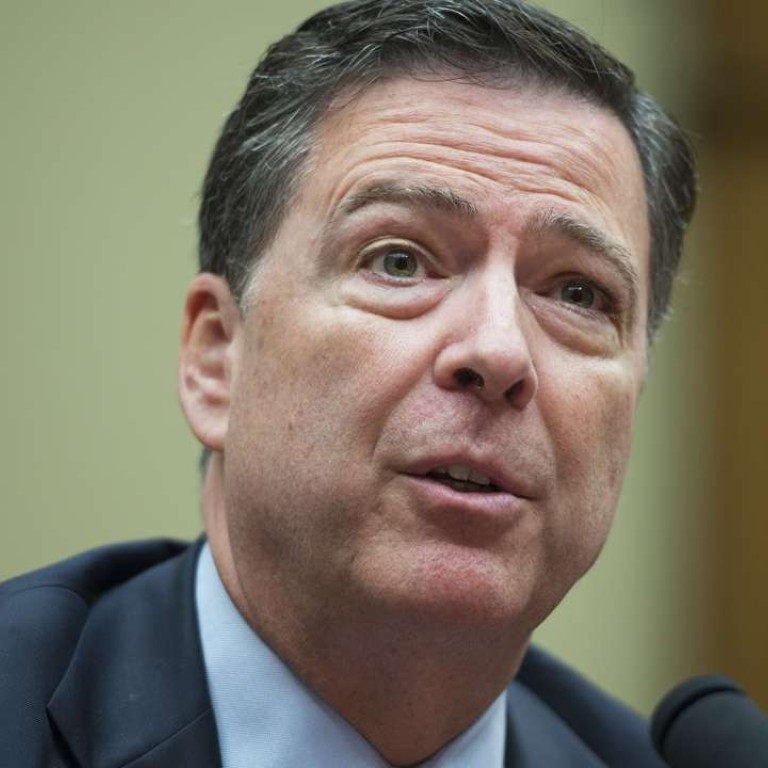
Why the FBI’s pre-election bombshell holds a lesson for Hong Kong
Albert Cheng says the bureau’s decision to reopen the investigation into Hillary Clinton’s use of a private email server – just days before the US presidential vote – shows how separation of powers should operate
Can the US political system survive this farcical presidential election?
Operating under the jurisdiction of the US Department of Justice, the FBI director is a member of the US intelligence community and reports to both the attorney general and the director of national intelligence. Separation of powers is a cornerstone of the American government. President Barack Obama, a Democrat, supports Clinton, but he has never abused his power to meddle with an FBI investigation.
Comey is now being savaged for violating the long-standing Department of Justice policy of refraining from taking law-enforcement action close to an election. Meanwhile, the atmosphere at the FBI has been very different. After Comey announced in July he would not recommend charges against Clinton, some agents felt he had brought disgrace to the bureau by letting her off the hook, and several have resigned.

Where to now for the ICAC?
The chief executive and the liaison office have jumped on the opportunity to make a mountain out of a molehill
By reopening Clinton’s case, Comey must have anticipated the magnitude of the pressure he would have to face. He opted to press ahead. Irrespective of whether his decision is justified, there is a clear separation of powers between law enforcement and the executive arm of the government.
By contrast, ICAC comissioner Simon Peh Yun-luu was criticised for supposedly not backing Li in her endeavour to take on the chief executive. It is hard to ascertain whether such criticism is fair. Still, his decision dealt a blow to morale in the commission.
The ongoing Legislative Council oath-taking saga, involving Sixtus Baggio Leung Chung-hang and Yau Wai-ching from Youngspiration, is another case in point. The chief executive and the central government’s liaison office have jumped on the opportunity to make a mountain out of a molehill, accusing Leung and Yau of insulting the entire Chinese race with their antics. In an unprecedented move, the chief executive filed a judicial review against Legco president Andrew Leung Kwan-yuen’s ruling to allow the two to retake the oath.

At the same time, pro-Bejing groups protested outside Legco, while tycoons advertised in newspapers to coerce the Legco president not to allow the pair a chance to retake their oaths. They are determined to put an end to the duo’s budding political careers.
Worse, Beijing is now so agitated it is poised to impose an interpretation of the Basic Law, presumably to prevent the trouble-making councillors from taking office. A legal challenge initiated by the chief executive in the local courts might be concluded by the National People’s Congress. This prospect has deeply worried the local legal fraternity.

Innocence lost in the dirty fight to choose Hong Kong’s chief executive
At such a critical juncture, retired judge Woo Kwok-hing has stepped forward to run for chief executive. The liberal candidate has won people’s hearts. For one, he notes that even though the separation of powers is not spelled out in the law, it has become a deep-rooted doctrine here that regulates government operation.
Even before the Hong Kong court started to hear the case, Leung Chun-ying said he could not rule out the possibility of an NPC interpretation of the Basic Law. Woo is among the most vocal to tell Leung he was wrong, adding that he shouldn’t even be commenting on the case given that he is also a plaintiff. If it were a “one person, one vote” election for the chief executive, Woo could beat Leung, and even Financial Secretary John Tsang Chun-wah, hands down.
Albert Cheng King-hon is a political commentator. [email protected]

